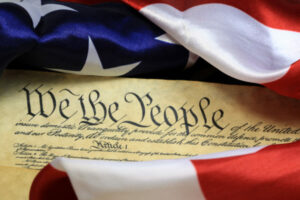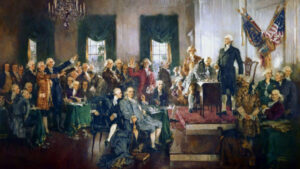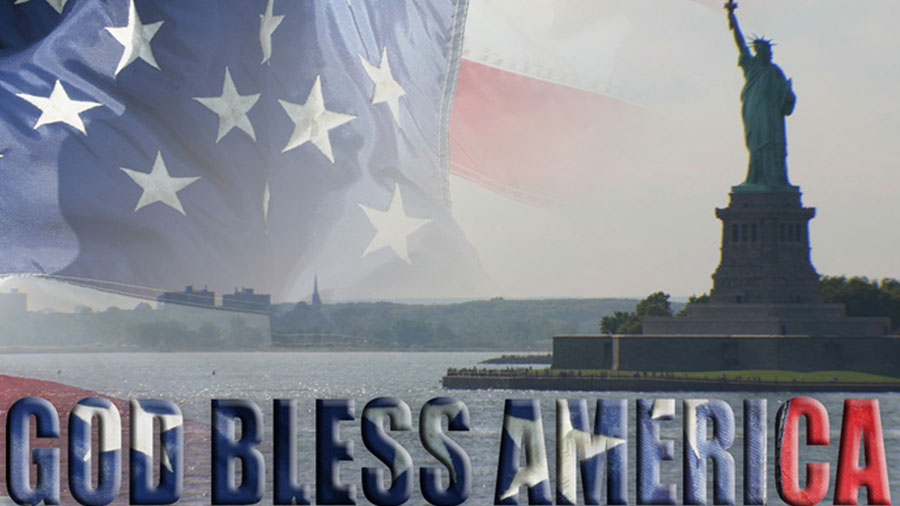 The United States of America is governed by a written Constitution – which is a landmark legal (as well as a philosophical and political) document that greatly limits the power of government; safeguards certain individual rights, such as freedom of expression and freedom of religion; and establishes a system of “checks and balances” on the executive, legislative and judicial branches of the federal government.
The United States of America is governed by a written Constitution – which is a landmark legal (as well as a philosophical and political) document that greatly limits the power of government; safeguards certain individual rights, such as freedom of expression and freedom of religion; and establishes a system of “checks and balances” on the executive, legislative and judicial branches of the federal government.
But why? What is the Constitution? Why is it important to know the Constitution? How do we learn the Constitution? And do we really NEED a written Constitution?
After all, many countries don’t have a written Constitution. England, for example, has an “unwritten” Constitution, often referred to as Common Law, which is the byproduct of five different parts:
England and many of her former colonies – including Canada, Australia and India – also rely on similar versions of Common Law. It works like this: A judge renders a ruling in a country or region that is “common” to the King’s courts in England and her territories, and these decisions are expected to have “precedent” in similar legal cases, meaning that future judges are obligated to honor the thought-process of the judges who preceded them.
It’s not necessarily a BAD form of government, but Common Law has several key flaws that our Founding Fathers deliberately sought to avoid when creating our federal government:
First of all, under the American theory of government, all of our rights are derived from our Creator – God Almighty – and NOT from a King, Queen, parliament or even a judge. This was a radical departure from all other countries at that time, as well as prior. Consider: If our rights are derived from humans, then humans could also take them away! But if our rights are bestowed by God Himself, then no human would ever have the moral authority to confiscate them, because the rights are “inalienable.”
Additionally, since our rights are God-given, we have a moral obligation to protect them from humans who want to abridge them. That’s why the American Revolution was, in the eyes of our Founding Fathers, a morally-justified struggle for liberation: King George III had no legal right to deny us the rights, liberties and freedoms that the Almighty chose to give to us. Thus, we were morally obligated to defend our rights from being abridged.
In a very literal sense, it was a “holy war.”
During the Revolution, our Founding Fathers were in clear violation of English Law – they were traitors, guilty of insurrection against the British Crown – but that didn’t matter, because they were following God’s Law.
But please note that the objective of our Founding Fathers was NOT to establish a pure democracy. (The word “democracy” doesn’t appear in either the Constitution or the Declaration of Independence.) Instead, their goal was to establish a new form of government that protected individual rights. The Revolutionary War was a war against a monarch, but it was absolutely NOT a war in favor of democracy. In fact, our Founding Fathers were deathly afraid of democratic rule, because they understood that the “tyranny of the majority” was just as evil as the tyranny of a King.
Many people wonder, “Is the United States a republic or a democracy?” Or, “What is the difference between a democracy and a constitutional republic?” Due to inadequacies in our educational system, these questions are a source of much confusion. The answer is, the United States is a constitutional republic. And it’s a VERY important distinction:
Our Constitution places specific limits on the powers of government; almost all of the Amendments to the Constitution place limitations on what government can and cannot do. A pure democracy does not do this; a pure democracy is mob-rule, which the Founding Fathers deliberately sought to avoid. In a pure democracy, it would be one man, one vote – and whatever the majority wants at the time would then become the law of the land.
Fortunately, that’s not how it works in America.
Even if the majority of Americans wanted to make Christianity (or any other religion) the official religion of our country, the Constitution would prohibit it. Even if the majority of Americans wanted to limit your right to criticize certain politicians or religious figures, the Constitution would prohibit it. Even if the majority of Americans wanted to ban you from possessing firearms, the Constitution would prohibit it. No matter if one man agrees with you – or if 200 million people agree with you – the Constitution will prevent these laws from being implemented.
“Democracy is two wolves and a lamb voting on what to have for lunch. Liberty is a well-armed lamb contesting the vote,” noted Benjamin Franklin. In fact, after the Constitutional Convention when asked by a lady “Well, Doctor what have we got, a republic or a monarchy,” his reply was, “A republic . . . if you can keep it.”
To protect us from tyranny in ALL its horrible forms, our Founding Fathers decided to codify our liberties in a singular, all-encompassing document that would form as a protective shield for the American people: the United States Constitution. No matter what Congress, the President or the majority of the citizens want, it will always be illegal to pass a law that establishes an official religion for the United States of America, because our God-given rights have supremacy over ANY manmade laws.
Today, these Constitutionally-protected rights include:
Because of the United States Constitution, these rights belong to YOU, to all of us. Nobody has the legal (or moral) authority to take them away.
 There are other reasons why we have a Constitution: It makes a powerful statement about who we are as a people – i.e., the values we share, the beliefs that bind us, and our rules for governance. Because of the Constitution, we know that the United States of American is a nation subservient to God: We don’t enjoy the protections of free speech because a legislator or a judge says so; we have free speech because God says so. Additionally, a Constitution is transparent; unlike common law, where you must pilfer through centuries of (oft-contradictory) judicial decisions, constitutional statutes are clearly defined. The Constitution is predictable and reliable; it’s there for all to see (unless, of course, you believe the Constitution is a “living, breathing document” that can be redefined via judicial whims).
There are other reasons why we have a Constitution: It makes a powerful statement about who we are as a people – i.e., the values we share, the beliefs that bind us, and our rules for governance. Because of the Constitution, we know that the United States of American is a nation subservient to God: We don’t enjoy the protections of free speech because a legislator or a judge says so; we have free speech because God says so. Additionally, a Constitution is transparent; unlike common law, where you must pilfer through centuries of (oft-contradictory) judicial decisions, constitutional statutes are clearly defined. The Constitution is predictable and reliable; it’s there for all to see (unless, of course, you believe the Constitution is a “living, breathing document” that can be redefined via judicial whims).
Furthermore, America has a Constitution because of “E Pluribus Unum” – “Out of Many, One.” Originally, we were 13 separate colonies, but in actuality, those original colonies were more akin to 13 autonomous nations. It was a far different time in our nation’s history; allegiance to a state superseded allegiance to our fledgling, newly-unified American country. When we decided to forego the failed Articles of Confederation and form a new national charter, we needed a new document that allowed the citizens of the 13 different colonies to unify as one new nation – the United States of America. But after a costly, bloody war for independence, the very last thing our Founding Fathers desired was more tyranny. That’s why the Constitution was created. In fact, some of our greatest Founding Fathers refused to endorse the Constitution until the Bill of Rights (which contains the first 10 Amendments) were added.
So, the short answer to the question, “Why do we have a Constitution?” is simple: We have a Constitution to protect us from tyranny. But the longer essay delves into the fears and aspirations of our Founding Fathers; the historical context of the time; and their unwavering faith in God.
To learn more about the Constitution, please watch In Search of Liberty – an exciting, family-friendly Educational Dramatic Comedy movie about our Founding Fathers, the Constitution and American history! It’s a lot of fun, and it’s the perfect resource for teaching the Constitution to middle and high school students… and grownups, too!

